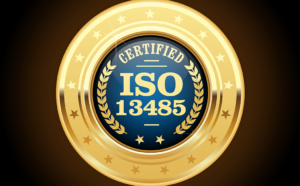Why ISO 13485 Internal Auditor Training Is a Must for Clinical Lab Professionals

Imagine you’re running a clinical laboratory, juggling test results, regulatory inspections, and a team that’s stretched thin. One day, a batch of medical devices fails quality checks, and suddenly, you’re facing a recall scare. The stakes? Patient safety, your lab’s reputation, and potentially millions in losses. Sounds like a nightmare, doesn’t it? For professionals in clinical laboratories, mastering quality management isn’t just a box to check—it’s a lifeline. That’s where ISO 13485 Internal Auditor Training comes in, and trust me, it’s a game-changer.
This training isn’t about memorizing standards or slogging through compliance manuals. It’s about equipping you with the skills to keep your lab running like a well-oiled machine, ensuring every device and process meets the highest quality standards. So, why should clinical lab professionals care about ISO 13485 Internal Auditor Training? Let’s break it down with a clear head and a conversational vibe.
What’s ISO 13485, and Why Does It Matter to Your Lab?
ISO 13485 is the global benchmark for quality management systems (QMS) in the medical device industry, including clinical laboratories that handle diagnostics or testing equipment. It’s a framework that ensures your processes—from calibration to documentation—are consistent, reliable, and compliant with regulations like those from the FDA or EU’s MDR. For labs, this is critical. A single faulty device or inconsistent test result could jeopardize patient outcomes.
Here’s the thing: ISO 13485 isn’t just about avoiding regulatory slaps on the wrist. It’s about building confidence—confidence that your lab’s work is accurate, safe, and trusted by healthcare providers and patients alike. A 2024 study by PwC found that 72% of healthcare organizations prioritize suppliers with robust QMS certifications. Want to stay competitive? ISO 13485 is your ticket.
Who Should Be Taking This Training?
You might be wondering, “Is this just for quality managers?” Not at all. While quality assurance folks are prime candidates, ISO 13485 Internal Auditor Training is for anyone in a clinical lab who touches processes or devices. Lab managers, technicians, regulatory specialists, and even senior leadership can benefit. Why? Because quality isn’t a solo act—it’s a team effort.
- Lab Managers: You’re overseeing operations, from equipment maintenance Mobile to staff training. This training helps you ensure every process aligns with ISO 13485 standards.
- Technicians: You’re the ones handling devices daily. Training equips you to spot quality issues, like an improperly calibrated analyzer, before they escalate.
- Compliance Officers: You’re navigating a maze of regulations. This training gives you the tools to audit your QMS and stay ahead of inspections.
- Executives: If you’re in the C-suite, understanding ISO 13485 helps you make informed decisions about resource allocation and risk management.
Honestly, if you’re in a clinical lab, this training is for you. It’s about taking ownership of quality, no matter your role. Plus, it’s a resume booster—who doesn’t love that?
What’s the Payoff for Your Lab?
Running a clinical lab is like conducting an orchestra. Every instrument—every process, device, and team member—needs to be in tune. ISO 13485 Internal Auditor Training ensures your lab hits all the right notes. Here’s why it’s worth your time:
- Fewer Errors, Better Outcomes: Trained auditors catch inconsistencies, like incomplete documentation or faulty equipment, before they affect patients. A 2023 report by McKinsey noted that labs with strong QMS reduced error rates by up to 20%.
- Regulatory Peace of Mind: Whether it’s the FDA, EU, or local health authorities, auditors ensure your lab stays compliant, avoiding costly fines or shutdowns.
- Improved Efficiency: Auditing isn’t just about finding problems; it’s about streamlining processes. Less waste, fewer delays, and happier staff—what’s not to love?
- Trust and Reputation: In an era where patients and providers demand transparency, ISO 13485 certification signals your lab’s commitment to quality. It’s a trust magnet.
Let me share a quick story: I recently saw a post on X about a lab in Europe that faced a recall after a diagnostic device malfunctioned. The root cause? A gap in their QMS that went unnoticed. With a trained internal auditor, they could’ve caught it early. That’s the kind of headache this training helps you avoid.
What’s Covered in the Training?
Now, let’s get to the good stuff—what do you actually learn? A typical ISO 13485 Internal Auditor course, like those from providers such as SGS or BSI, runs about three to five days and blends theory with hands-on practice. It’s not just sitting through lectures; it’s engaging, practical, and dare I say, kind of empowering. Here’s a snapshot:
- Mastering ISO 13485: You’ll learn the ins and outs of the standard, from design controls to risk management. It’s like getting a roadmap for quality excellence.
- Audit Techniques: From planning to reporting, you’ll practice conducting audits, interviewing staff, and reviewing records. Think of it as detective work with a quality twist.
- Risk-Based Approach: You’ll learn to identify risks—like a supplier’s subpar components—and propose fixes that keep your lab compliant.
- Handling Non-Conformities: Finding issues is one thing; fixing them without disrupting operations is another. The training teaches you how to manage discrepancies smoothly.
- Communication Skills: Auditing isn’t just technical. You’ll learn how to present findings to your team and inspire action, even when the news isn’t great.
The best courses use real-world scenarios. You might simulate an audit of a diagnostic lab or tackle a case study about a faulty blood analyser. It’s practical, relatable, and keeps you engaged.
Choosing the Right Training Provider
Not all training programs are equal, and picking the right one can feel like finding a needle in a haystack. Here’s how to choose wisely:
- Accreditation Is Key: Look for providers certified by bodies like IRCA or Exemplar Global. This ensures your training is recognized globally.
- Practical Focus: The best courses include hands-on exercises, like mock audits of a clinical lab. Ask about the curriculum before signing up.
Putting It to Work in Your Lab
Once you’re trained, it’s time to roll up your sleeves. Imagine this: your auditor spots a documentation gap in how your lab tracks device maintenance. They work with the team to fix it, preventing a potential FDA audit issue. Or maybe they identify a supplier providing inconsistent reagents, saving your lab from a costly recall. These are real wins, and they start with trained auditors.
Here’s a quick plan to make it happen:
- Pick Your Champions: Identify who in your lab would shine as an auditor—think lab managers, senior technicians, or compliance leads.
- Set Clear Objectives: Are you auditing internal processes? Suppliers? Focus the training on your lab’s needs.
- Schedule Regular Audits: Use your auditors to check processes quarterly or biannually. Consistency is key.
- Spread the Knowledge: Trained auditors can mentor others, building a culture of quality across your lab.
A Quick Digression: The Bigger Picture
You know what’s fascinating? The medical device industry is evolving at lightning speed. Just this summer, X was buzzing with posts about AI-driven diagnostics and stricter regulations in Asia. Labs that don’t keep up risk falling behind. ISO 13485 Internal Auditor Training isn’t just a skill—it’s a mindset. It’s about staying proactive, ensuring your lab is ready for whatever comes next, from new regulations to cutting-edge tech.
Your Next Steps: Make It Happen
So, what’s the move? If you’re in a clinical lab, ISO 13485 Internal Auditor Training is your chance to level up. It’s about protecting patients, streamlining operations, and showing the world your lab means business.
Here’s a parting thought: in a field where precision saves lives, being a quality leader isn’t optional—it’s essential. Why wait for the next audit or recall to act? Get trained, get your lab in top shape, and keep delivering results that matter.


